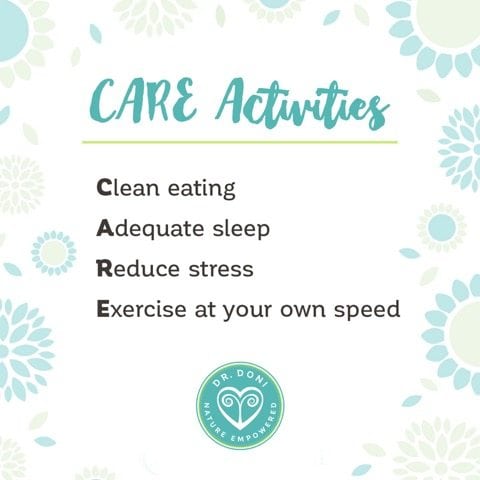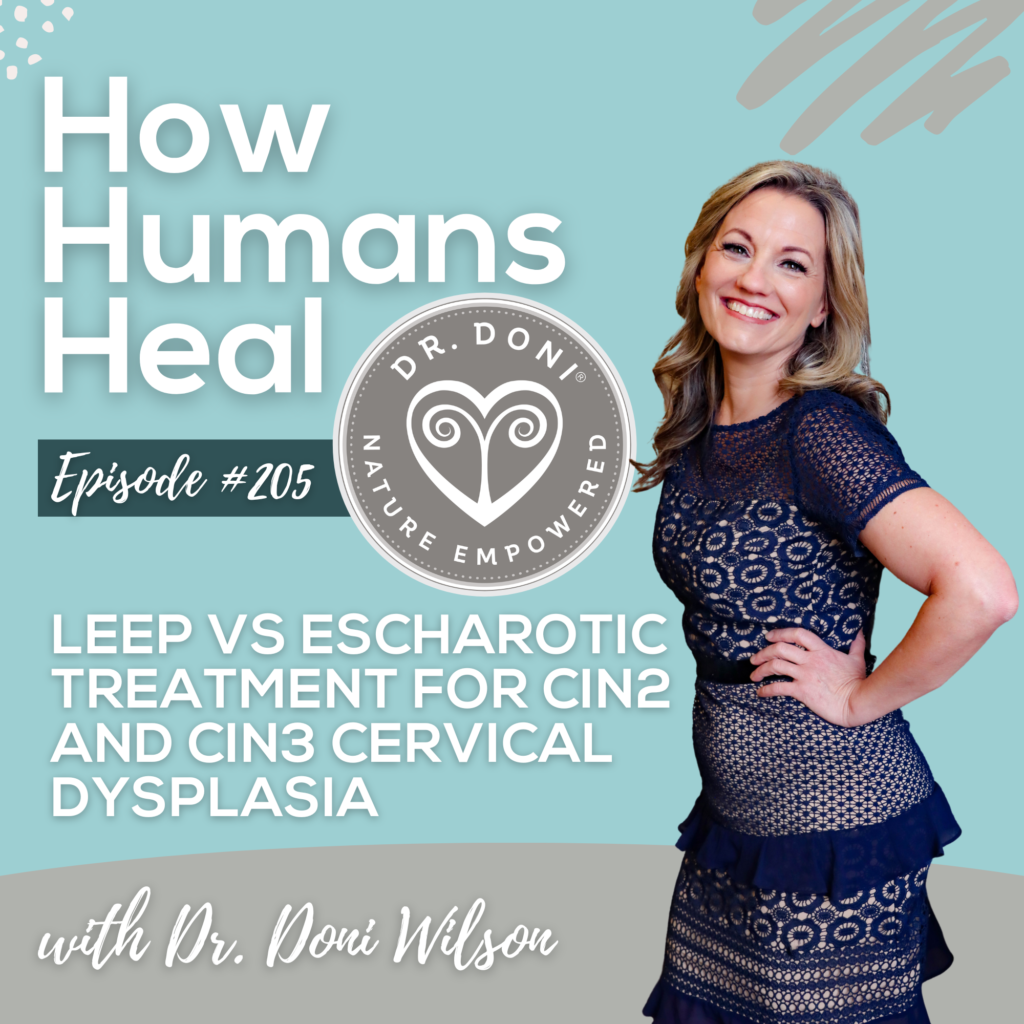
An Empowered Woman’s Guide to Peri-Menopause
- Home
- Women's Health & Fertility
- An Empowered Woman’s Guide to Peri-Menopause

Dr. Doni explains the process a woman’s body goes through during peri-menopause and how to address the symptoms so your transition to the menopause is a smooth one.
 We often hear about hot flashes, night sweats, and vaginal dryness when discussing peri-menopause. There are a bunch of other symptoms as well that can come along with a transitioning menstrual cycle, including fatigue, anxiety, insomnia, joint pain, weight gain, high blood sugar levels, headaches, digestive issues, low thyroid function, and flares of autoimmunity. Women with these symptoms often feel left out when it comes to health care because the symptoms are not often discussed or addressed, and if they are, the only suggestion given is often a prescription medication with side effects.
We often hear about hot flashes, night sweats, and vaginal dryness when discussing peri-menopause. There are a bunch of other symptoms as well that can come along with a transitioning menstrual cycle, including fatigue, anxiety, insomnia, joint pain, weight gain, high blood sugar levels, headaches, digestive issues, low thyroid function, and flares of autoimmunity. Women with these symptoms often feel left out when it comes to health care because the symptoms are not often discussed or addressed, and if they are, the only suggestion given is often a prescription medication with side effects.
During peri-menopause, many women struggle to understand what is going on in their body, so I want to take some time here to explain.
An important thing to know about peri-menopause is that the symptoms can start even ten years before your period actually stops happening. The average age at which the period comes to an end is 51 which means some women experience symptoms caused by hormonal changes starting in their early 40s. We don’t yet know what exactly determines how peri-menopause will turn out for you, but from my experience, it comes back to my usual equation:
genetics + stress exposure = your health
And I want to remind you that we have a lot of control on how that equation works out at any point in our lives, but in particular during peri-menopause. Even though our genes are our genes and cannot be changed, we can affect the way they influence our health. And even though many stresses are out of our control, there are others that we can make choices about every day. So with awareness, understanding and commitment to yourself and your health, you can make a difference in the way you feel – and peri-menopause is a perfect example.
I always find that understanding the cause of symptoms can help us to know how to address them, so let’s look at the symptoms of peri-menopause and how they come about.
Peri-Menopause and How It Works
The whole point of menopause is that the ovaries gradually stop responding to the hormone signals to ovulate and produce estrogen and progesterone. This means we stop ovulating and estrogen and progesterone levels reduce (I know this is blindingly obvious but I think it’s worth emphasizing the point). To some degree, this process happens with age, but it is also influenced by cortisol levels.
Remember that stress causes cortisol levels to be higher or lower than optimal – what I refer to as adrenal distress – and cortisol communicates with our ovaries. This means that altered cortisol levels can decrease effective ovulation. When ovulation occurs, progesterone is produced – so, if you’re stressed, cortisol levels are disrupted, which disrupts ovulation and leads to the ovaries producing less progesterone. Decreasing progesterone production is common in early peri-menopause and is often referred to as “estrogen dominance” (more estrogen than progesterone) being produced. This causes PMS-type symptoms, fibroid growth, breast tenderness, mood fluctuations, acne, and menstrual cycles to be shorter or longer than usual.
Then, as peri-menopause progresses, the ovaries can skip ovulation altogether, leading to much lower progesterone levels even though estrogen may still be produced. This can lead to frequent periods and/or heavier bleeding, as well as irritability and insomnia.
When estrogen does start to decrease it’s often not a smooth, progressive reduction, it tends to be a turbulent process. Think of turbulence on an airplane and how bumpy it makes the ride. It’s the same with decreasing estrogen; estrogen levels go up, and then down, sending signals to the blood vessels to constrict and then dilate. This causes hot flashes and night sweats, as well as migraine headaches. I find that if you tended toward headaches or any other symptoms earlier in your life, you’re more likely to experience that again during peri-menopause.
That’s because, as estrogen and progesterone levels become low, other hormones and systems in the body shift, creating more symptoms. Vaginal dryness occurs when vaginal cells are depleted of estrogen, and with vaginal dryness comes an increased likelihood of vaginal and bladder infections. Insulin function decreases, leading to higher blood sugar levels and more likelihood of gaining weight, especially around your waist.
Inflammation can increase for some women, as well as autoimmunity, leading to joint pain and flares of such conditions as Crohn’s, Hashimoto’s, Lupus, and Rheumatoid Arthritis. The nervous system, digestion, and sleep cycles (separate from waking in a pool of sweat) can also be disrupted, causing you to be grumpy, bloated, and tired.
Peri-Menopause Has an Effect Throughout the Body
More than anything, during peri-menopause, women are reminded that estrogen and progesterone influence more than just the uterus. These hormones travel in our blood and have the ability to influence our nervous system, immune system, blood vessels, liver detoxification, thyroid function, insulin and blood sugar, and so much more, which is why the symptoms can be so varied and seemingly random.
In awe of the power of these hormones and the connectedness of our bodies, women are often humbled by the experience of unpredictability and having no other option but to accept that their body is changing. Many women greet this change with elation – glad to be done with monthly hormonal cycles and the symptoms that accompany them. Others wish that the benefits of estrogen and progesterone – such as fertility, vaginal health and libido – would continue forever.
How Naturopathy Helps with Peri-Menopause
There are ways to support both of these perspectives and usher women through this transition with as few difficulties as possible – and without medications and their side effects. That’s where naturopathic medicine comes in as a way to use diet, sleep support, exercise, stress reduction, herbal and nutrient approaches, and more to help women.
One of the first ways to support is by identifying adrenal distress by testing cortisol and adrenaline levels. The more we can optimize these, the better you’ll feel.
Then we need to check your neurotransmitter levels, which can be tested in urine, so we know exactly how your nervous system has been affected by peri-menopause. We can then support what’s low using precursor nutrients, or reduce what’s high with other nutrients and herbs.
It also helps us to know your body by testing estrogen and progesterone levels, as well as the metabolism of estrogen and progesterone, as well as testosterone, melatonin, and DHEA. That is best done with a urine test.
My next step is to check for leaky gut and any imbalances of the bacteria living in the digestive tract. We can do this by testing for delayed food sensitivities and doing a stool test that shows both how well you digest food and the balance of bacteria living in your intestines. Then, once we have all this information, we can address the imbalances using diet changes and supplements.
By the time we have taken these steps, very often the symptoms of peri-menopause have calmed quite a bit and we can use herbs and/or natural (bio-identical) hormones to address any remaining symptoms as necessary. At that point it is best to meet with me so I may provide personalized recommendations. Read about the Women’s Wellness Solutions Package here.
To get started down this path, I encourage you to consider following the Stress Remedy Program, which supports you to make diet changes and time for self-care such as exercise, meditation and sleep, while taking a protein shake as a meal replacement and supplements to help heal leaky gut.
 If you’re already implementing the C.A.R.E. activities of the Stress Remedy Program, but you’re not feeling better yet – or if you simply feel like you need some one-on-one support – then you might be interested in meeting with me for a consultation (can be by phone). I can then guide you through the steps I have mentioned in this article and that are included in my Women’s Wellness Package. You can make an appointment here.
If you’re already implementing the C.A.R.E. activities of the Stress Remedy Program, but you’re not feeling better yet – or if you simply feel like you need some one-on-one support – then you might be interested in meeting with me for a consultation (can be by phone). I can then guide you through the steps I have mentioned in this article and that are included in my Women’s Wellness Package. You can make an appointment here.
If you’re not quite sure how you’d like to begin, you could maybe start by signing up to receive my weekly e-newsletter, this way I’ll continue to send you the articles I write about health and healing, and you can keep learning little by little. When you sign up for the newsletter you’ll also receive – for free – my newest ebook called A Guide to Adrenal Recovery.
You can do this! You can get through it, just as you’ve gotten through many other things. We just need to figure out what kind of support your body needs – this will be unique to you – and then give it! Allow self-care to pave the path through peri-menopause.
–Dr. Doni
12th December 2016
Share this Post:
Dr. Doni Wilson's Team
14 Day Detox Program
Take the Stress Type Quiz
Dr. Doni Social Media
Popular Posts


The 5 Burnout Types

Healing HPV Holistically: Dr. Doni on the Inspire Health by Jen Podcast

Recent Podcasts
Signup to receive our weekly newsletter with all the latest news, podcasts and special offers
New Book - Order Today!

SIMPLE PRACTICES for SHIFTING FROM YOUR STATE of STRESS to YOUR FLOW and FREEDOM
MASTER YOUR STRESS
RESET YOUR HEALTH
Order Now! Related Posts

What is making you susceptible to HPV?
I have been working with women who had abnormal cells on their cervix and/or vaginally, caused by HPV for over 20 years now. And while

The 5 Burnout Types
Did you know there are 5 burnout types? They are based on your Stress Type®, which is how your adrenal function has been affected by

Healing HPV Holistically: Dr. Doni on the Inspire Health by Jen Podcast
Dr. Doni was interviewed by Jen Ciszewski on the Inspire Health by Jen Podcast, talking about how to heal away HPV from your body for good.

Stress and Trauma: The Science Behind It, How It Shows Up and How to Heal: Dr. Doni on The Burn Fat and FEAST Podcast
Dr. Doni was interviewed by Sarah B. Thomas on the Burn Fat and FEAST Podcast, talking about the impact of stress and trauma on our health and what to do to recover from them.














